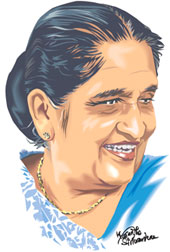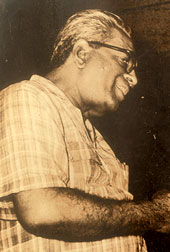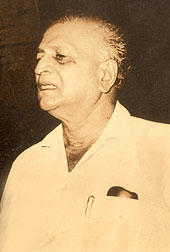|
March 22, 1965 political turning point:
Hath Havula led to first 'National Government'
by Uditha Kumarasinghe
The General Election of March 22, 1965 paved the way for the concept
of a National Government making a dramatic change in the country's
political fabric when Prime Minister Dudley Senanayake formed the 'Hath
Havula' or the first seven party coalition government in Sri Lanka to
preserve democracy in the country. 'Hath Haula' mainly comprised veteran
Marxist Guru Philip Gunawardena, Federal Party agitator M. Tiruchelvam
QC and several other prominent politicians.
 |
 |
 |
| Sirimavo
Bandaranaike |
Colvin R. de
Silva |
Dr. N.M.Perera
Pix: ANCL Library |
Prime Minister Sirimavo Bandaranaike's government collapsed on
December 3, 1964 when C.P. de Silva, Leader of the House and Minister of
Land, Irrigation and Power took the irrevocable step of crossing the
floor of the House and finally casting his vote along with 13 other MPs
against the government of Sirimavo Bandaranaike on the Throne Speech.
Consequently, Parliament was dissolved on December 17, 1964 and fresh
polls were held on March 22, 1965.
Allegations
The March General Election was a fight for a democratic way of life
as represented by those opposed to the Government in power as against
what was called by the opposition "the crude attempts at dictatorship".
In a message on January 10, 1965, on the eve of nomination day, UNP
Leader Dudley Senanayake said " When the people trek to cast their votes
on March 22, they will be deciding whether this country is to go under
the yoke of foreign dictators or not. During the election campaign,
Premier Bandaranaike said that there were allegations that she was
trying to set up a dictatorship in the country. She said if she wanted
to be a dictator, she could do so easily because the the Police and the
Armed Services were under her control. She further said that she had no
such intention and she was only interested in protecting " the
parliamentary system of democracy."
Full term
Another landmark of the 1965 political transformation was that
teenagers between the ages of 18 to 21 exercised their franchise for the
first time at the 1965 General Election. They obtained their vote as a
result of an amendment to the election laws passed in 1960. It was
stated by the Elections Department that 82 percent exercised their
franchise at the 1965 General Election and that was the highest
percentage ever recorded.
However, a new UNP-led National Government consisting of seven
political parties was formed after the General Election of March 22,
1965. The seven coalition partners of the 1965 National Government were
the United National Party(UNP), Federal Party (FP), Sri Lanka Freedom
Socialist Party(SLFSP), All Ceylon Tamil Congress(ACTC), Mahajana Eksath
Peramuna(MEP), Jathika Vimukthi Peramuna(JVP) and the Ceylon Workers
Congress(CWC).
Dudley Senanayake was appointed Prime Minister for the fourth time on
the results of the 1965 General Election and he completed his full term
of five years, the first time in Sri Lanka's parliamentary history when
a Prime Minister completed the full term of five years. A Cabinet of 17
Ministers headed by Premier Senanayake was sworn in on March 27, 1965 by
the Governor General William Gopallawa.
A total of 4,056,467 voters had been polled at the General Election.
A total of 494 candidates of whom 14 were women contested the elections
and there were 4771 polling booths. When election results of the 1965
March General Election were announced no single party had obtained a
simple majority on its own. The UNP polling 1, 579,181 of the votes had
obtained 66 seats. The Sri Lanka Freedom Party (SLFP) polling 1, 226,
833 of the votes came next with 41 seats. Federal Party (FP) was third
with 14 seats and it had polled 217,986 votes.
The Lanka Sama Samaja party (LSSP) polled 302,095 votes and obtained
10 seats while the Communist Party (CP) got 109,744 votes with 4 seats.
Among the other parties secured seats were the SLFSP led by C.P. De
Silva which polled 129, 986 votes getting 5 seats. The Tamil Congress
led by G.G. Ponnambalam got 98,726 votes and 3 seats. The MEP led by
Philip Gunawardena polled 110,388 votes and got a one seat while the JVP
led by K.M.P. Rajaratne secured 18,791 votes with a one seat.
Political parties
Yet another significant feature of the 1965 General Election, was
that apart from these MP's from accredited political parties, six
candidates contesting as independents were also elected in 1965 polls.
They were Prins Gunasekera (Habaraduwa), Percy Samaraweera (Welimada),
M. A. Abdul Majeed (Pottuvil), M.S. Kariapper (Kalmunai), R.G.Senanayake
(Dambadeniya) and Mudiyanse Tennekoon (Nikaweratiya). An interesting
feature of the poll was that of elections not being held to two-member
electorate of Colombo South. J.R. Jayewardene of the UNP and Bernard
Soysa of the LSSP were the only candidates to have filed nomination
papers there in 1965 and both were elected unopposed as Colombo South
MPs. It was generally expected that as soon as the full election results
were announced on March 23, 1965, Mrs.Sirimavo Bandaranaike would hand
over her resignation to the Governor General and allow His Excellency to
call whoever commanded a majority in the House of Representatives and
entrust him with the task of forming a new government.
But Mrs. Bandaranaike hesitated and there was a delay of nearly 40
hours before she finally resigned. Winding up the debate on the
Governor-General's speech from the Throne, Dudley Senanayake stated in
the House of Representatives on April 23, 1965 " We are aware of the
rally on Galle Face where an attempt was made to induce the then Prime
Minister to ignore democratic traditions.
We are well aware of the fact that was the reason for delay in
dissolving Parliament. We are also well aware of the fact that you
brought large numbers again to prevent then Prime Minister from
resigning. I am not blaming the Leader of the Opposition. I am blaming
those who talk glibly of democracy, but who are wedded to the complete
elimination of democracy".
On March 25, 1965, a statement signed by Dudley Senanayake (UNP),
S.J.V. Chelvanayakam (FP), C.P. de Silva (SLFSP), G.G.Ponnambalam (TC)
and Philip Gunawardena (MEP) was handed over to the Governor General.
Totalitarianism
The statement said " We represent an overall majority in the House of
Representatives, and we will support a National Government under the
leadership of Dudley Senanayake, leader of the UNP, pledged to protect
and preserve democratic freedom and to rescue the country from the
economic and other difficulties that now face it". Premier Senanayake
announced his National Government on March 27, 1965 which included the
members of those parties which fought for the preservation of the
democratic systems in the country in opposition to totalitarianism and
dictatorship.
When the political breakdown on the basis of party positions was
taken, it appeared the UNP with 66 seats was also sure of the support of
the SLFP Bloc of five MPs. The National Government of Dudley Senanayake
completed its full term and confidently went to the polls in 1970
seeking a renewed mandate from the people, but the Sri Lankan voters
passed a harsh judgement on the performance of the National Government.
The united front of the SLFP (91), LSSP(19) and CP (06) won 116 seats
out of 151 seats in Parliament and the UNP was routed with the party
getting only 17 seats. |

